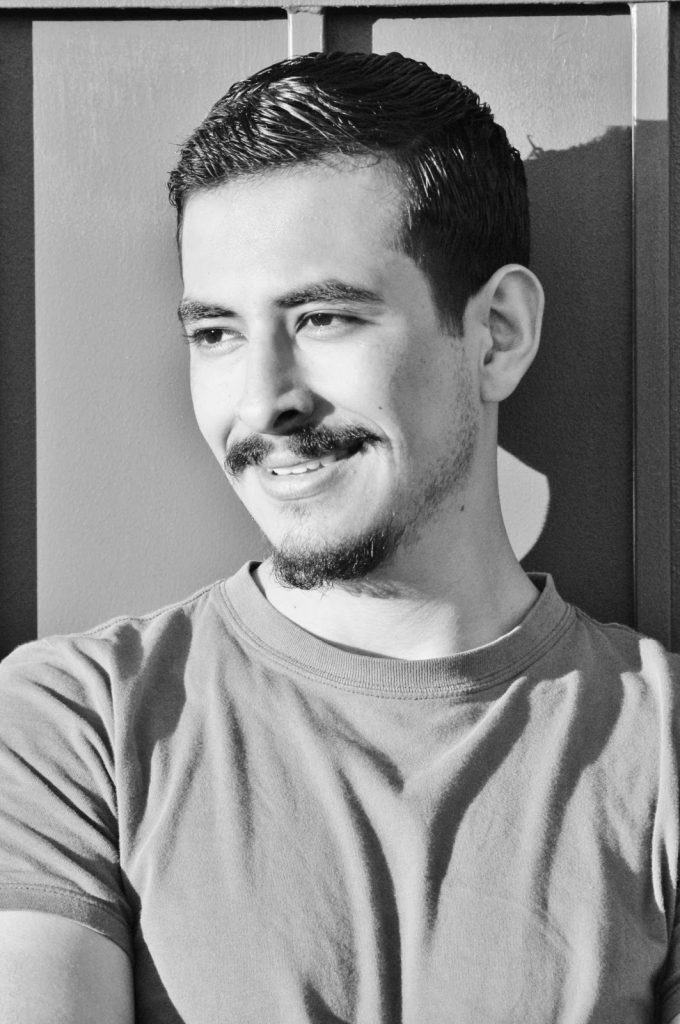Poet Activist Spotlight: Marcelo Hernandez Castillo
Poet and essayist Marcelo Hernandez Castillo’s work has appeared in Paris-American Review, Best American Poetry Blog, Ascentos, Muzzle Magazine, Jubilat, New England Review, BuzzFeed, and elsewhere. He is a Canto Mundo fellow and has received fellowships from Squaw Writer’s Workshop and the Vermont Studio Center. Alongside Javier Zamora and Christopher Soto, he has worked to eliminate citizenship requirements in poetry contests and awards through a project called Undocupoets. Marcelo, who crossed the border through Tijuana with his family at the age of five, was the first undocumented student to graduate from the University of Michigan’s prestigious MFA program. In his essay “Poetry As a Passport,” he provides an intimate portrait of his improbable, almost epic journey into and through his MFA program. He illustrates the danger of traveling across the country undocumented to attend the university, the fear of telling the department about his undocumented status, and a series of bewildering barriers and uncertainties, such as the inability to receive a teaching stipend until the passing of Deferred Action for Childhood Arrivals (DACA). Since the essay’s publication in 2014, it has lingered with me as a sort of generous haunting. He tells a story that is often unheard, largely because of the very real hazards involved in voicing undocumented status.
At the risk of romanticizing his work, I think that Marcelo Hernandez Castillo shows the tenacious imaginary capacity of poetry, how it can allow for a necessary revolution within the self, even when the world seems hopelessly cruel and slow. In his love poem “Cenzóntle,” Marcelo writes, “years from now / there will be a name / for what you and I are doing,” which, though weighted by a present lack, is ultimately future-building. I see a similar far-sighted, concerned fire in much of his interview responses below. He has an urgent insistence on holding himself and others to high standards. Maybe “high” isn’t the right word—having non-discriminatory literary contest rules should be a given and is not a high standard, but what I mean to say is that he demonstrates a relentless questioning, a persistent unwillingness to settle for the unacceptable.
Stevie Edwards: Can you tell me a little about how Undocupoets got started? I’d also love to learn about any successes and obstacles you all have encountered since the initial petition was shared in Apogee in January 2015.
Marcelo Hernandez Castillo: The group began with Javier [Javier Zamora] and Loma [Christopher Soto] who were both attending NYU at the time. They had the initial ideas behind it and I asked if I could be a part of the group. Before hearing about their new proposed campaign, I tried to contact some organizations on my own in regards to their guidelines, but didn’t get far. Once I heard Javier and Loma were starting something more official, I was eager to join them.
Since we launched the initial petition, we successfully changed the citizenship requirements from every major first book poetry prize in the country. We collaborated with Southern Humanities Review for a special issue focusing on undocupoets and were fortunate to receive the Writers for Writers award from Poets & Writers in New York City. We are also excited about a new fellowship funded through Amazon which will grant scholarships to undocupoets to submit to the different prizes that are now open to them, and soon we will be announcing a new member to our team. However, with as much success that we saw, not every organization completely met our expectations. Some prizes stipulated certain caveats that still exclude people. Although it’s a change in the right direction, my only fear is that if we stop pushing back, then whatever flaws remain in some of the guidelines will be nearly impossible to change in the future. There’s probably a name for this that I can’t think of at the moment, but I’m afraid that people will see this as “enough,” and not consider any further action. So I’m hesitant to say we succeeded in changing everything that we originally set out to change. Yes, we’ve opened the doors for some undocumented poets to be heard, but still not everyone can participate. My biggest fear is that people will think this was a one time thing, rather than an ongoing process. What we achieved so far were only the first steps of a much longer plan. I just hope that presses and organizations won’t think that they have already done enough.
What’s dangerous is that I think the next step will be ten times harder than the first. I can’t help but wonder what will happen if we ask more from them? What if we say that their applicants shouldn’t need TPS or DACA? Will they say that they have done enough? And that is what worries me. I feel like we need a second wave of resistance to adjust some of the guidelines that we are not content with, but it will be much more difficult. I’ve probably already gone on too long so I’ll end with that note.
SE: How do you see the relationship between your poetry and the activist work you’re doing for undocumented people? Also, of all of the many spaces in which advocacy is needed on behalf of undocumented people in this country, is there something about poetry that makes it feel like an important place to focus your energy?
MHC: To be honest, I don’t know where else to focus my energy. Everywhere else seems like an impenetrable wall. The poetry community feels like a space in which I can make real change because people are willing to work with us. I do think that most of the resistance we’ve gotten is out of lack of information and knowledge on behalf of the organizations. When I was at the border this summer dealing with some family problems, I felt absolutely helpless. Neither appeals to emotion, logic, or ethics could make my point across to border agents. Maybe I’m taking the easy route. But I don’t see it like that. I see it as my way of effecting the most change that I am capable of in an area where my voice is most likely to be projected. I would be less effective at on-the-ground community organizing. So, I too have always been riddled with the question of “am I doing enough?” I don’t want to say that one sector of advocacy in the undocumented experience is more important than another—for example, legal advocacy work, food pantries, and immigrant labor rights. I feel very close to those individuals enacting change in their respective fields; I’m just working in the space that I can enact the most change. To be honest, I wish I had the strength that some community organizers have. All my praise goes out to them.
SE: In your essay “Poetry As a Passport” in BuzzFeed, you challenge the label of “Latino Poetry,” noting: “Binaries used to define an aesthetic (such as: is it Latino or not) serve only to limit and exclude creative possibilities and emerging voices. It’s wrong to think there exists only one form of Latino poetry.” I was wondering if you feel that there’s a pervasive aesthetic box Latino writers are frequently pressured (or assumed) to inhabit? If so, what does that box look like? What are some of its limitations?
MHC: I feel like this essay is a growing thought process and changes over time. At the time I wrote it, I did feel like an explicit binary existed, defining something as either-or. I’m not saying it doesn’t exist now but maybe these were internal anxieties about my own poetry, rather than a nuanced survey/observation of Latinx poetry in the US. Now, I’m not sure if I said that the binary “does” exist versus, “it’s wrong to think of one as possibly existing, or investing our critical vocabulary into an idea of a binary.” I guess I’m not making much sense. I’m trying to type this in a room full of chatty teenagers. But I’ve given this a lot of thought lately. Do we project this binary on Latinx poets or do we extrapolate it from the work recently produced? And who do I mean by “we?” Is it within the Latinx literary community or the larger Facebook regulated literary community? Maybe I’m growing and so I’m constantly changing what I think about my role and the Latinx role in American poetry. So maybe there is a box, but maybe it’s a transparent box and it’s a privilege to be able to see through it—into it. Maybe it’s a ghost or a mirror. I’ve always been bad at analogies.
Whatever you want to call it, or however you want to describe it, I think the point is that Latinx writers are at once challenging this aesthetic and uplifting it. But why is this only asked of us, or of POC in general, as if we’re the only ones who can be pigeonholed into these narrow definitions? I was in a room once with other Latinx poets and one proclaimed that he was fed up with white poets submitting poems to a journal he helps edit that were spilling over with Classical Greek mythology references. Like, we get it, you want to be Anne Carson. Not everyone can be Anne Carson, in fact only Anne Carson can be Anne Carson, to be honest. So, I guess I’m wondering why this question is always asked of POC. I feel like it’s a question that has already answered itself. I feel like it has already implied what it wants to hear, and has dismissed how I would like to answer it. Don’t get me wrong, though. I feel like it’s a necessary question, but I would also like to hear how white poets might also be boxed in a rigid definition of subject such as references to classical mythology, meta wikipedia references, brambles, hollyhocks, and cottonwoods or hemlock trees? I mean, I say this jokingly but also with a bit of truth? Why do we see that as the default from which things can diverge?
SE: In “Poetry As a Passport,” you also claim that you initially got into poetry because you were “in love with a girl named Rubi.” I might posit that without teenage infatuations, half of us wouldn’t be doing this poetry thing. I was wondering if you’d say the ways in which you turn to poetry have changed since then?
MHC: In a way I’m always and still writing because I’m in love with a girl named Rubi. The only difference now is that she’s my wife, and we’re not in high school anymore. Where would we be without memories of our angsty teenage selves? I didn’t really answer your question but in a way I think I did. I don’t turn to anything new just because I’ve received formal training in poetry, whatever that may be. Well, that’s a lie. While in high school and college I was trying to write about someone who I was not. So in a way maybe I have changed, but only changed to the points of reference in my life before I thought about becoming a poet. Those moments in which I’ve come to see as my truest self.
SE: This might not sound like a super intellectual question, but does it still make you feel afraid writing and/or publishing poems and essays about your undocumented status? Also, without DACA, do you think your writing would be significantly different?
MHC: Well, to clarify, I recently received my permanent resident status. I’m not a citizen yet but receiving my green card was bitter sweet. That doesn’t mean I’m not still afraid, either for myself or my family. It’s a reality that I don’t want to become numb to. I fear that it’s become so prevalent that I will reach an anesthetized state. But I don’t think it’s possible to be completely still, to be completely numb. Like I said, I was just at the border this summer. I had to plead with border agents. I cried. I left behind someone I loved. It tore me apart and I can never forgive this country for what it has done to my family even if I do eventually become a citizen.
SE: As a bit of a follow up, how do you see fear showing up in your poetry (topically, formally, tonally, etc)?
MHC: I haven’t written much new poetry after finishing my manuscript. I’m working on a book of essays now in which I talk about fear and how it shows up differently in different people and situations. I wish I wasn’t afraid, I wish this wasn’t my reality. What do I gain by recreating that fear in my poetry? I guess the takeaway from my BuzzFeed essay was that poetry saved me. Now I’m not too sure. I’m not sure how much poetry can do for me. Even if I had written poems worthy of a Nobel Prize, I wouldn’t have been able to continue my graduate program if I didn’t have a valid social security number. Yes, poetry helped[s] me but it can’t save me. If I’m ever deported, I’ll still write poetry, that I’m sure will never change. I don’t want it to seem like I need validation and recognition from a government to consider myself a person, but in order to function I need what the government denies millions of people. I need mobility, I need proper identification, and I need a number that says my real name.




